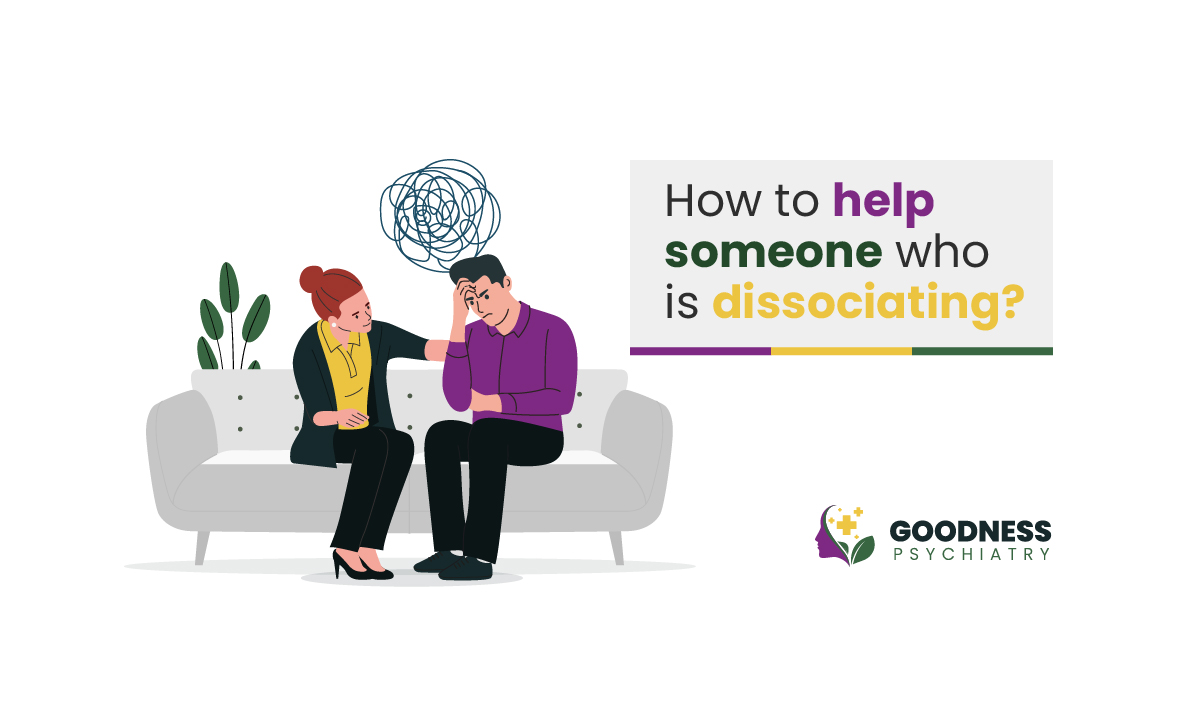Those who undergo dissociation might find the experience confusing and distressing.
It is a survival strategy employed by the brain to cope with severe stress or traumatic events through disengagement from thoughts, emotions, memories, or even one’s own personality.
If you have someone you know who has been dissociating, it is crucial to understand how best to assist them in overcoming the situation as it arises.
What is Dissociation?
Dissociation may manifest itself in various ways; this could include feeling like you are not part of reality or even losing touch of time and your identity.
Dissociating symptoms can look like:
- Zoning out or staring blankly
- Acting as if in a daze
- Feeling detached from your surroundings
- Memory lapses
- Identity confusion
It’s important to know these signs of dissociation.
How to Help Someone Who Is Dissociating
When you come across someone who is experiencing dissociation, here are tips on helping them out.
1. Stay calm.
Remain calm and composed. Your calm presence will assure the person that he/she is safe hence they should not be worried.
2. Grounding techniques.
Gentle grounding techniques for dissociation can make a person more present at the given moment.
Tell them to concentrate on:
- Describing objects in the room
- Noticing sensations like touch or smell
- Deep breathing exercises
- Encouraging physical movement like stretching or tapping feet
3. Validate their experience.
Acknowledge their feelings without judgment.
Let them know that it’s okay to feel the way they do and that you are there to support them.
4. Show your support.
Ask them what you can do for them.
Do not pressurize the person into discussing the events that led to their dissociation until they are ready.
5. Be patient.
Dissociation will take time to go away.
Be patient and understanding. Avoid hurrying the individual along or trivializing their experiences.
6. Create a safe space for them.
Ensure that the environment is secure and comfortable.
Turn down the noise if possible, designate a quiet place where they can regain themselves.
7. Suggest seeking professional help
If recurrent dissociation is present, it would be helpful if the individual sought out assistance from a therapist or psychiatrist.
Therapy offers coping abilities and support in dealing with instances of dissociation.
Wrapping Up
Supporting someone who is dissociating requires empathy, patience, and understanding.
Your calmness, grounding techniques, validation of their experience and providing safe environment will enable easier passage through episodes of disassociation.
In case you are facing challenges with dissociation or mental health issues, consider reaching out to Goodness Psychiatry for professional assistance and advice.
Book an appointment today.
FAQs
Can dissociation be dangerous?
Dissociation itself is not dangerous but it can cause risky behaviors if the person is not fully aware of their surroundings.
Getting professional help can provide strategies for managing dissociative episodes.
How long do dissociative episodes last?
The duration of dissociative episodes can depend on the person and the triggering factors. Some episodes can last only a few minutes and some can persist for hours.
Is dissociation a sign of mental illness?
Dissociation can be a symptom of several mental health disorders like:
- Post-traumatic stress disorder
- Dissociative identity disorder
- Borderline personality disorder
But it can also occur in people without a diagnosed mental illness, especially in response to stress or trauma.
What is structural dissociation?
It’s a theory that suggests the mind can split into different parts as a response to trauma.
What is a dissociation test?
It’s an assessment used by mental health experts to measure the severity of dissociative symptoms.
What’s the connection between dissociation and dissociative disorders?
Dissociation is a defense mechanism and dissociative disorders involve severe and persistent dissociation.
What are dissociative identity disorder signs and symptoms?
Symptoms include:
- Experiencing multiple identities
- Memory gaps
- Confusion
- Detachment
What can include in dissociation treatments?
Treatment can include:
- Therapy
- Medication
- Techniques to manage dissociation signs and symptoms and address underlying trauma


No comment